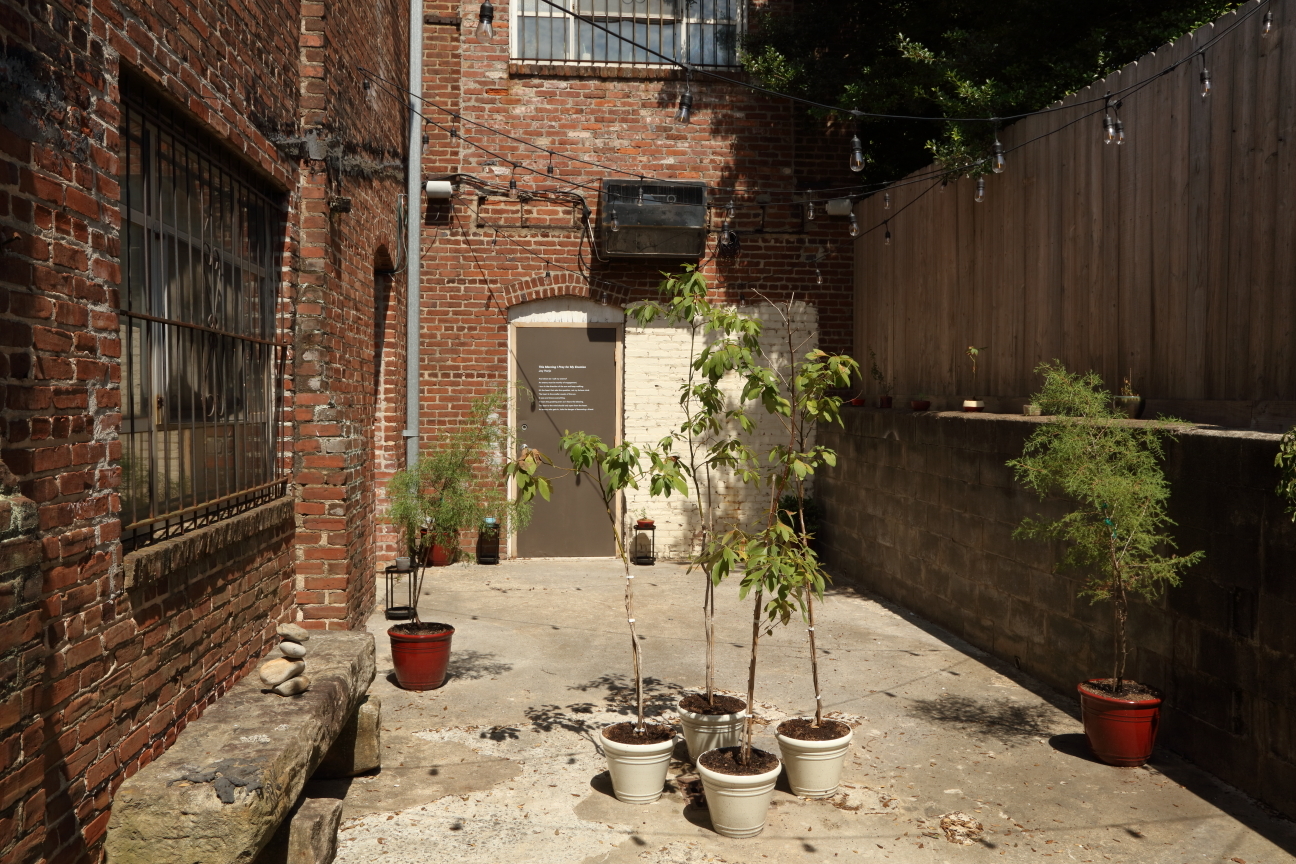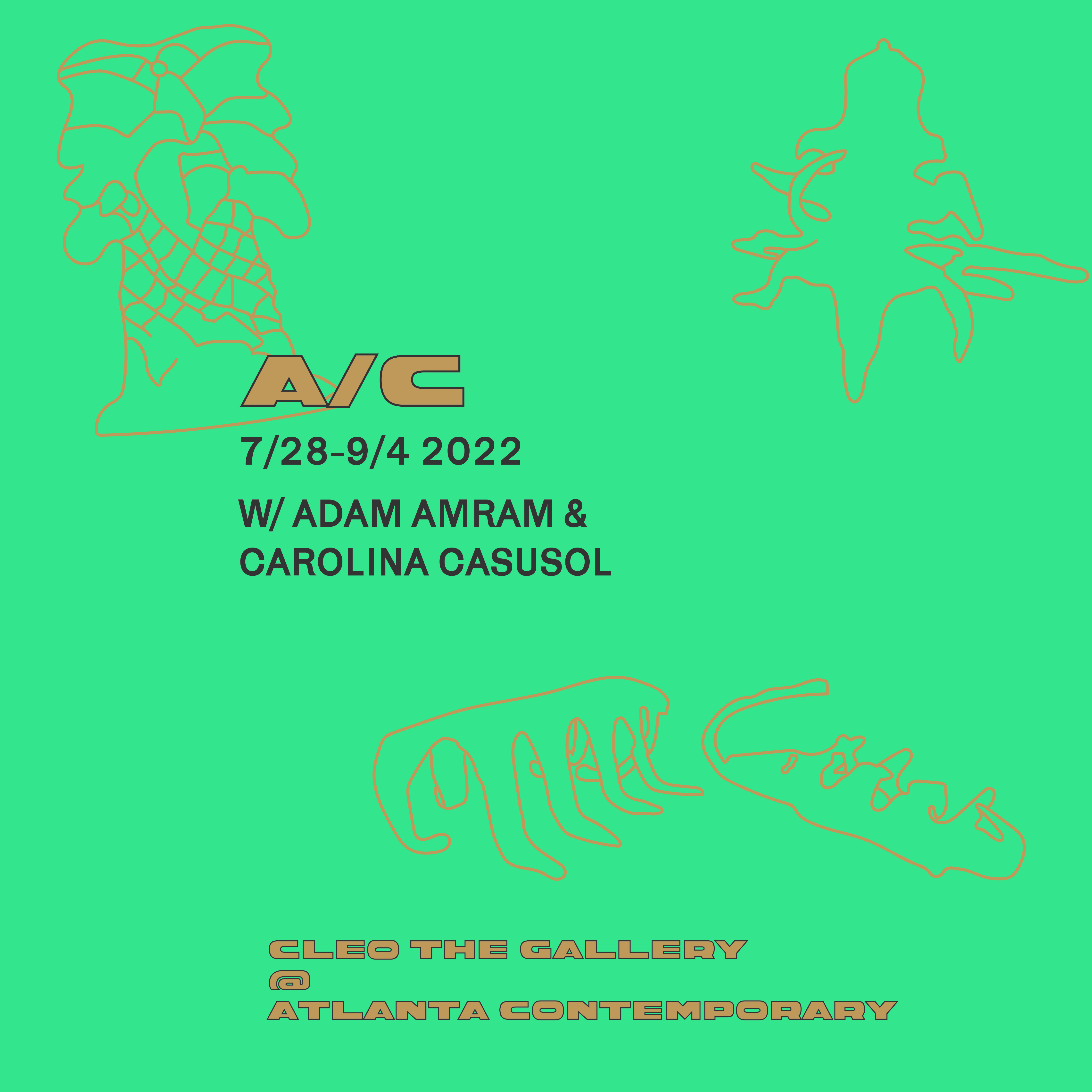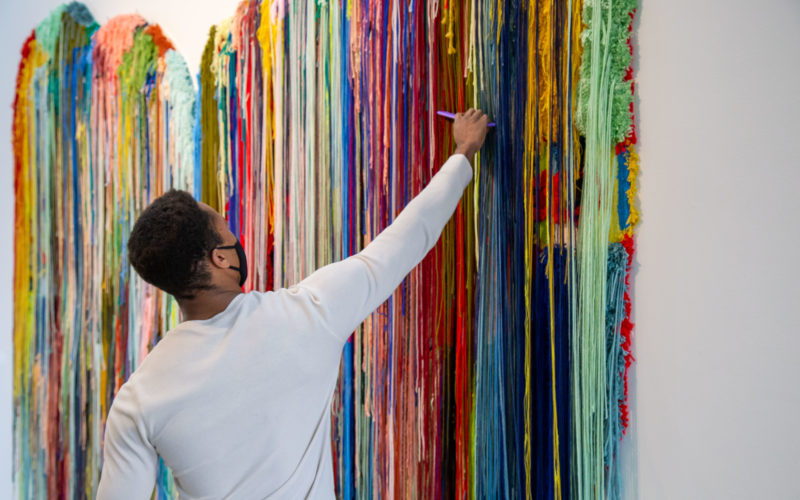Make a gift to help keep Atlanta Contemporary free, safe, and open to all.
You Are Heleswv (Medicine)
You Are Heleswv (Medicine)
June 11, 2022 – September 4, 2022
Erasure is a violent act. The forced removal of the Muscogee (Creek) and Cherokee from the Southeast can be described as nothing other than genocide. When we think of the word erasure, it seems almost childish. It conjures thoughts of No. 2 pencil lead being rubbed by a pink eraser, hitting ctrl+Z to undo something on your computer, or deleting something on your phone. In stark contrast, the erasure of Indigenous people from Atlanta is anything but childish. How do you delete an entire society of people? By taking away their relationship to the land. According to Philip Deere, the Muscogee people are “those who possess herbs.”[1] Our plants and medicines are a vital part of our identity. Our language, traditions, and ceremonies are held in these plants. These medicines are equally important to the Cherokee people, who were punished for planting seeds while they were marched along the Trail of Tears.
The title You Are Heleswv (Medicine) suggests that each artist and their embodied knowledge, which is presented in their work, is healing on a physical and spiritual level. The video TOTSU (Redbird) by Jeremy Charles (Cherokee) incorporates the Cherokee language, themes of Murdered and Missing Indigenous Women (MMIW), and Indigenous Futurism. Nathaniel Cummings-Lambert’s (Eastern Band of Cherokee Indians) contribution, featured in Sliver Space, is a Deed of Cultural Easement at Atlanta Contemporary, which will grant the property to Cherokee and Muscogee (Creek) citizens for cultural use. Kalyn Barnoski’s (Cherokee) work stems from the great tradition of Cherokee weaving and basketry. Barnoski uses the theme of weaving in literal and metaphorical ways. Patrick Freeland (Muscogee), a Mvskoke gardener at College of Muscogee Nation, shows heleswv in vessels created by Cindi Wood (Muscogee) in The Secret Garden. Accompanying our Mvskoke plants are the poems Stomp All Night and This Morning I Pray for My Enemies by Joy Harjo (Muscogee), award-winning U.S. Poet Laureate. In the Chute Space a ceramic sculpture by Raven Halfmoon (Caddo) serves as a reminder that when the Cherokee and Muscogee arrived in Indian Territory, they displaced other Indigenous people residing there, including the Caddo. This was part of the U.S. government’s design to create conflict and competition between tribes. Also in Chute Space, Kyle Bell (Muscogee) passes on the knowledge of our Mvskoke foods, including sofky, which is considered a medicine that cleanses the inner parts of our bodies.
[1] Muskogee Creek Elder, 1929 - 1985
Bios
Kalyn Barnoski
Kalyn Fay Barnoski (Cherokee Nation enrollee, Muscogee Creek descent) is an interdisciplinary artist, musician, curator, and educator from Oklahoma. Centering Indigenous and decolonial methodologies, their work focuses on self-location, community-building, collaboration, and empathy through the use of music, publication, storytelling, and contemporary craft. They hold an M.F.A. from University of Arkansas (2021), an M.A. from The University of Tulsa (2016), and a B.F.A. from Rogers State University (2012).
Kyle Bell
A Native American filmmaker from the Thlopthlocco Creek Tribal Town, Kyle Bell is based in Tulsa, Oklahoma.
As a director, cinematographer, editor, and photographer, he strives to tell the stories of his people, “stories that don’t get told or whose voices are not heard.”
His documentaries have earned him multiple awards and a Heartland Emmy.
He was a 2019 Sundance Indigenous Program Fellow and a 2020 Tulsa Artist Fellow.
Bell is currently the Rolex Mentor and Protégé Arts Initiative Protégé to cinema legend Spike Lee.
Kyle is working on a new documentary short to be executive produced by film director Kathryn Bigelow.
Jeremy Charles
Jeremy Charles is a writer/director/producer/cinematographer and leader of FireThief Productions, a Cherokee-owned film production company. Beginning his career as a graphic designer and freelance writer, Jeremy spent a decade as a photographer recognized for his bold portraiture and work in the music scene. He has been proud to lend his eye and expertise to Cherokee Nation projects for the past 15 years. Since answering the call of filmmaking, Jeremy has filled nearly every role in production in hundreds of short docs, narrative shorts, branded content, and music videos. He is a co-creator, producer, and director for “Osiyo, Voices of the Cherokee People” which has earned five regional Emmys, and he was awarded Best Director in 2017 for the documentary short “Singing Tradition”. His direction of the music video for ‘Everybody Needs’ by Branjae earned Judge’s Choice Graphex award in 2018, and his films have been selected for numerous film festivals.
Nate Cummings-Lambert
Nathaniel Cummings-Lambert (Sylva, NC) is a Ph.D. student in Sociocultural Anthropology and the Culture and Media certificate program at New York University. He holds a BA in Religious Studies from Eugene Lang College, The New School and an MFA in Art from California Institute of the Arts. He is an enrolled member of the Eastern Band of Cherokee Indians located in Cherokee, North Carolina. His art has been exhibited at Southampton Art Center (2022), Alta Art Space in Malmö, Sweden (2019), Socrates Sculpture Park (2018-2019), and Utah Museum of Contemporary Art, Salt Lake City, UT (2018). His films have been screened at the Asinabka Festival (2021), Engauge Experimental Film Festival (2019), Northampton Film Festival (2019), Milwaukee Underground Film Festival (2018), Cosmic Rays Film Festival (2018), Anti-Matter Film Festival (2011), and the Dorothy H. Hirshon Film Festival (2011).
Patrick Freeland
Patrick Austin Freeland, Wind Clan of the Muscogee Nation of Oklahoma, serves as an educator and communicator, committed to action to promote the advancement of community and educational institutions through the integration of plural knowledge systems, employing excellence in design, and leading innovation through adaptation. Through interdisciplinary sciences, arts, and engineering, Patrick’s vocation seeks to integrate living systems and contemporary knowledges as a means of addressing significant environmental challenges through cultural revitalization and community engagement. He currently serves as a Natural Resources Instructor at the College of the Muscogee Nation and leads the Mvskoke Cultural Gardens, which seeks to continue Indigenous Mvskoke traditional ecological knowledge, as well as to integrate modern agrotechnologies for synthetic-chemical-free food production, increasing biodiversity, and ecosystem restoration. Patrick is also the director for the Livelihood Knowledge Exchange Network (LiKEN) Knowledge Sharing Network: Centering Indigenous Knowledge Systems project, and leads the BuildingAFire.org website which offers freely available resources licensed under Creative Commons, to support Indigenous and non-Indigenous climate educators and students. Patrick continues to engage novel and creative endeavors which span the boundaries of healing and peace-making, community advancement through adaptive management, utilization of media and information technologies, and intercultural communication.
Raven Halfmoon
Raven Halfmoon (Caddo Nation) is from Norman, Oklahoma. She attended the University of Arkansas where she earned a double Bachelors Degree in ceramics/painting and cultural anthropology. Her work has been featured in multiple exhibitions throughout the U.S. as well as internationally. Raven is currently based in Helena, MT where she is an artist in residence at the Archie Bray Foundation for Ceramic Arts. She is represented by Kouri + Corrao Gallery in Santa Fe, NM.
Joy Harjo
Joy Harjo is an internationally renowned performer and writer of the Muscogee (Creek) Nation. She is serving her second term as the 23rd Poet Laureate of the United States. The author of nine books of poetry, including the highly acclaimed An American Sunrise, several plays and children’s books, and two memoirs, Crazy Brave and Poet Warrior, her many honors include the Ruth Lily Prize for Lifetime Achievement from the Poetry Foundation, the Academy of American Poets Wallace Stevens Award, two NEA fellowships, and a Guggenheim Fellowship. As a musician and performer, Harjo has produced seven award-winning music albums including her newest, I Pray for My Enemies. She is Executive Editor of the anthology When the Light of the World was Subdued, Our Songs Came Through — A Norton Anthology of Native Nations Poetry and the editor of Living Nations, Living Words: An Anthology of First Peoples Poetry, the companion anthology to her signature Poet Laureate project. She is a chancellor of the Academy of American Poets, Board of Directors Chair of the Native Arts & Cultures Foundation, and is the inaugural Artist-in-Residence for the Bob Dylan Center in Tulsa, Oklahoma, where she lives.
Cindi Wood
Cindi Wood is a citizen of the Muscogee (Creek) Nation, Fox Clan. She is an interdisciplinary artist specializing in sewing, painting, beading, basket-making, storytelling, music, and pottery. She attended Oklahoma State University and the University of Houston-Clear Lake and has a bachelor’s and master’s in biology, a master’s in Instructional Technology, and one in Educational Management. She has taught in Texas and Oklahoma for over thirty years and is passionate about offering cultural arts to her students at the College of the Muscogee Nation.


